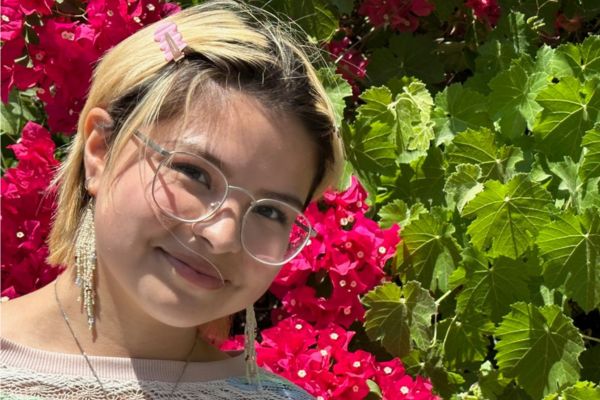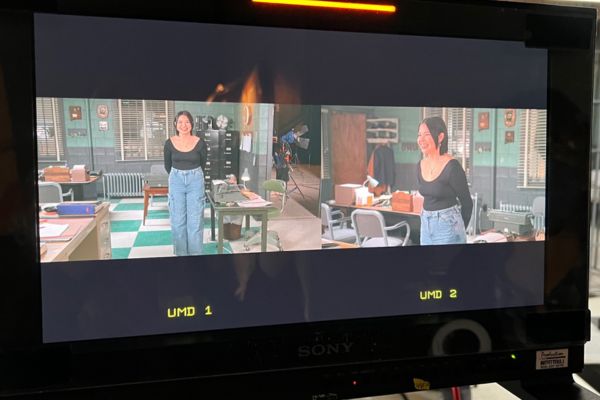
- Details
- By Neely Bardwell
This Pride Month, Native News Online spoke with LGBTQ and two-spirit relatives to get their perspectives on what it means to identify as queer in Indian Country, finding joy through cultural connection, and what they hope for the next generation of LGTBQ and two spirit Indigenous peoples.
The following interview is with two-spirit actor and star of hit Hulu show “Reservation Dogs” Elva Guerra (Mexican and Ponca Nation). Guerra shares their experience being an openly two-spirit and queer Indigenous person on the film industry, feeling empowered by acting and being a queer Indigenous role model.
This interview has been edited for clarity and length.
Do you identify with the term two-spirit?
I do. It’s been a tough kind of journey identifying with two-spirit. Still, I’ve gotten a lot of comments, and I’ve talked with a lot of other two-spirit people, and I think that they helped me identify with that word way more and know what it means to me and what it means to be two-spirit specifically.
I think it’s beautiful that we can reclaim that as queer indigenous people. It’s a specific word just for us, and I love that. It’s definitely been a journey and kind of a tough time figuring out who and what I am, but I think that one thing that makes me solidify my identity is the word two-spirit and hanging out with other two-spirits and talking to them about that. It’s just a very nice community to have.
What does being two-spirit mean to you?
Two-spirit means to me that I’m just me. At the end of the day, I’m just here, and I’m just Elva, and I like that. I don’t make it that complicated because it can be very easy to dive into this world and get lost and confused because there’s so much you can talk about: being queer, non-binary, two-spirit.
Being two-spirit to me just means being protected and valid in my identity. I’m neither a man nor a woman, but I feel a lot of qualities in both that I relate to and have always related to since I was very young. It’s definitely very affirming, to me, the word two-spirit.
What does Pride mean to you as an Indigenous person?
I never thought I would be comfortable in my skin and identity. As a young person, I had a lot of internalized homophobia. And so the fact that I get to be this free as a queer Indigenous person, it’s so amazing to me because it wasn’t until I started believing in my identity and showing my identity that I saw other people who were like me.
There’s that sense of comfort in that, especially seeing all these other Indigenous queer people in Pride. I saw you [interviewer Neely Bardwell] going to Pride and my other friends going to Pride, and like just being free being themselves, and it’s so beautiful that I see that. It actually warms my heart. I love that we all can be free in our identities in all ways, whether they’re being Indigenous, doing your traditions, or being a queer person and being happy with who you love. I love that for people. Our people are just full of happiness. And that’s all you want is to be free and happy and love. We want to love at the end of the day.
What makes you feel the most authentic?
Ironically, acting makes me feel the most authentic because you have to remember who you are while playing a different person. There are boundaries that you have to put up as an actor, and I think that the most authentic you can be is being truthful with yourself and putting up those walls when you know you’re uncomfortable.
I think acting has brought out a lot in me, especially being a queer person. I’m also navigating predominantly straight worlds, like the film industry, and it’s hard to try not to lose yourself. I think I’m the most authentic in that world because I constantly remember who I am. I can’t ever forget that when I’m working.
 (courtesy photo)
(courtesy photo)
Have there been any experiences on the Reservation Dogs set where you had a moment where you felt empowered or had a self-realization moment?
There are a lot of those, actually. My co-star Devery Jacobs is also a queer Indigenous person. We both mesh off of each other very well. She has always made me feel comfortable in my identity and uplifted me in that way. There’s a bunch of Aunties on that set that take you under their wing and make you feel like you belong at the end of the day, no matter who you are.
I think all the Aunties on that set just make you feel powerful. That female energy is always so amazing to be around every time I’m on that set. I really enjoy the other writers. I love them, all of them, and they also make me feel empowered. But it’s just something about female energy, and I know at least one person can relate to that. It’s just something about it. It just makes you feel good about yourself. So that’s definitely the one thing that I love when I come back to the Rex Dogs set, and all the women are there on that set who make me feel good about myself and feel like I belong.
What are some challenges you face as a two-spirit Indigenous queer person?
It was kind of difficult when I first started identifying, when I first started being proud of who I was, because it was like I was paying attention to how other people treated me, and just at the end of the day, it’s just messes with you if you do that.
I think to get over the challenges of people only looking at me and seeing a woman or looking at me and seeing something that I’m totally not, it’s just like, I can’t think about that for too long. I think that’s what’s kept me going —forgetting about other people’s opinions and what they think of me because it really doesn’t matter.
I’m very secure in my identity, which will never change. I think that I just like going out every day, and publicly saying who I am just solidifies that. Nobody can say anything to me. At the end of the day, you have to worry about yourself. You can only make yourself happy. I really like to be in control of my emotions, and at that point, it is hard for queer Indigenous kids because it’s still not really normalized in our communities.
There’s still a lot of homophobia and transphobia, especially. I think just me trying to be in the limelight and to keep being in this space, will shed some light on those problems. That’s really the one thing that I want to advocate for is Indigenous people who go through all of that, and I think that’s the one thing that really keeps me going even with all the hardships of being an open queer Indigenous person. It definitely makes me keep going because I just want to help queer Indigenous people, even if it’s just a little bit.
What advice would you give to other two-spirit and queer Indigenous kids?
That’s my favorite question because I get so sentimental when thinking of young queer Indigenous kids. I was them at one point, and I know what they’re feeling, and I know that they sometimes feel like it can be very isolating and very lonely, and I just want them to know that we exist and we’re still here.
If you ever want to reach out to any of us, any of the queer Indigenous role models, just do. Go vent to my DMs, or just come to me. There’s always a different option besides the saddest option. I always want to protect young Indigenous kids because I know how much you’re going through, and I know that it’s hard, and I know that you might want to give up, and I don’t blame you. I really don’t. I was in that position at one time, but you have to see the beauties of the world.
I would just love it if you stayed here with us and did that with us. We need more open Indigenous kids and people in this community and just a lot of love. I hope that I can give that to them. Whether through the screen or meeting people, I love meeting queer Indigenous kids because it makes my heart so full to see that they look up to me.
I just want to tell the queer Indigenous kids to keep on going, man. We really are all rooting for you. We’re all here for you, and we’re all doing this for you and for us. We love you. We really do.
More Stories Like This
Watermark Art Center to Host “Minwaajimowinan — Good Stories” ExhibitionMuseums Alaska Awards More Than $200,000 to 12 Cultural Organizations Statewide
Zuni Youth Enrichment Project Takes Top Emerging Artist Apprentices to Phoenix for Artistic Exploration and Cultural Immersion
From Dishwasher to Award-Winning Chef: Laguna Pueblo's Josh Aragon Serves Up Albuquerque's Best Green Chile Stew
Rob Reiner's Final Work as Producer Appears to Address MMIP Crisis
Help us defend tribal sovereignty.
At Native News Online, our mission is rooted in telling the stories that strengthen sovereignty and uplift Indigenous voices — not just at year’s end, but every single day.
Because of your generosity last year, we were able to keep our reporters on the ground in tribal communities, at national gatherings and in the halls of Congress — covering the issues that matter most to Indian Country: sovereignty, culture, education, health and economic opportunity.
That support sustained us through a tough year in 2025. Now, as we look to the year ahead, we need your help right now to ensure warrior journalism remains strong — reporting that defends tribal sovereignty, amplifies Native truth, and holds power accountable.
 The stakes couldn't be higher. Your support keeps Native voices heard, Native stories told and Native sovereignty defended.
The stakes couldn't be higher. Your support keeps Native voices heard, Native stories told and Native sovereignty defended.
Stand with Warrior Journalism today.
Levi Rickert (Potawatomi), Editor & Publisher


